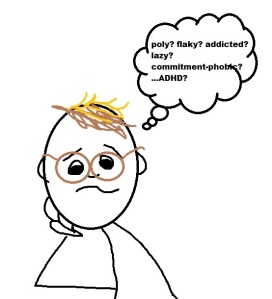
I had a look through my top search terms and below some very specific ones, i.e. people looking for me specifically, this question was closest to the top. I thought I’d try it out in Google and my page, in fact, is in the top ten when I type this phrase in.
So I’ll try to answer this question as best as I can.
First of all, there are authors out there who know a hell of a lot more about this stuff than I do. Their wisdom is humbling. Start off by doing some research.
Here’s a basic reading list of books:
Blogs to check out:
As for my advice, based on my own experiences, there are some key points to ask yourself if you’re wondering whether to explore polyamory.
What are your views about sex?
Do you believe that sex is fun, natural and an important part of life? Do you feel that it is a need, something that you have a right to have fulfilled? Is it something you can do without and still feel fulfilled? Do you have any guilt or shame associated with sex, alternative sex practices, homosexuality or paraphilias? Are you currently with a partner who for whatever reason, leaves you feeling sexually unfulfilled? Is polyamory appealing to you because you want to have sex with more than one person, or because you feel constrained within a monogamous relationship? Is your partner’s pleasure important to you? How would you feel if your partner had better sexual chemistry with someone other than you?
The reason these are important questions is because sex is a big part of this. If you are able to honestly assess your sexuality, and openly talk about sex, polyamory will be a lot easier for you. If you have any discomfort about sex, either your own sex life or that of any of your partners, that’s something to work on.
All that said, it’s possible you are not a very sexual person. Maybe you are asexual or demisexual. This does not mean you have to miss out on multiple loves. I have met several people with low sex drives who still live a poly lifestyle. The best part of that is, they do not have to have ‘perfect’ sexual chemistry with each of their partners. They are happy for their partner to find sexual chemistry with someone else, and are happy to have the pressure off them to be more sexual than they want to be.
Are you an honest person?
Do you share everything with your partners? How do you feel about ‘little white lies’ or lying to protect someone’s feelings? Are you able to talk about things which are uncomfortable, awkward or unpleasant? Do you like to keep certain things to yourself, or preserving some privacy?
Honesty is very, very important in polyamory. I cannot stress this enough. If you feel that people have a right to their secrets, or that someone doesn’t have a right to know about something that doesn’t directly affect them, then maybe polyamory is not right for you. I’m not saying there isn’t a place for privacy in polyamory, it’s just that it is something each couple (or triad or whatever configuration) needs to negotiate for themselves. If you prefer a Don’t Ask Don’t Tell arrangement, your partner needs to be comfortable with that. If you don’t want to know details, then if your partner is a sharer, you’re going to have conflict. You just can’t base a decision about whether to share information on how you feel in the moment, whether because of fear of judgement or because witholding that information gives you power. You also cannot make assumptions about what someone ‘needs to know’ or ‘has a right to know’ for them. These kinds of things are best sorted out before there is anything to know. For me, it’s better to err on the side of over-sharing than under-sharing. Nothing feels worse to me than feeling like I’m not getting the whole story. Some people don’t need to know everything, so long as they feel loved and trust that their partner is practicing safe sex. In all cases, lying, either by falsehood or omission takes away a person’s consent, even if that lie is with the best of intentions.
Are you a good communicator?
Do you choose your words carefully? Do you speak your mind without a filter? Can you clearly express your thoughts and ideas, or do you often find yourself struggling to find the right words and often say the wrong thing? When you’re unclear on somebody’s meaning, do you ask them to clarify or do you assume you know what they mean and act accordingly? Are you good at reading someone’s actions when their words don’t add up, and do you ask questions to make sure you don’t misinterpret them?
Communication is hard. If we could hook up our brains to cables, and transmit our thoughts in binary, polyamory would be a walk in the park. Sometimes, even then there would be miscommunications. Sometimes, it’s easy to take what people say at face value. Personally, I’m a what-you-see-is-what-you-get kind of person, and I sometimes miss important information because I listen to what people say rather than reading their actions. I’m getting better at doing the latter, and I’ve been able to avoid some conflict because of this. Communication is essential in creating trust and establishing consent.
How good is your emotional intelligence?
Do you usually know how you feel? Are you able to articulate your feelings or do you tend to react before you think about them? Do you respect the feelings of others, or do you think someone’s feelings are their own problem? Do you allow yourself to have feelings, or do you suppress them to avoid conflict?
As a mother, I’m starting to try to teach my son to identify and express his emotions in a healthy way. I’d rather he say, “I’m angry” than throw things or hit another child. Tantrums are expressions of emotions: frustration, anger, fear, loss, rejection and even embarrassment. In adulthood, we do some of the same things, or we punish people around us for making us feel negative things. Maybe we don’t throw Lego blocks around the room, but we might yell and kick the furniture. We might threaten violence, or use our emotions as a weapon.
In polyamory, we often talk about ‘owning your emotions’ as a key to avoiding jealousy. Jealousy itself is a sign of other, deeper emotions and insecurities. When you own your emotions, you don’t hold them back, saying, “don’t worry about me, I’m just feeling ____.” Or worse, keeping them to yourself because it’s not how you’re “supposed to” feel or you have “no right” to feel that way. This can be very hard to overcome. The ability to identify, communicate and negotiate your emotions is extremely important, and if it’s something you don’t do naturally, you’ve got to be willing to work on it, to try to improve and to forgive others when they mess things up. Owning your emotions means you are able to say “I am feeling some anxiety whenever you’re out with ____, and I’m afraid I’m going to be replaced. This is my own issue and I’m trying to get over it, but it would help me if you call and check in if you’re staying overnight, just until I start feeling more secure.” Statement of feelings, admission that this is not the other person’s fault, and a suggestion of a solution.
By contrast, “I don’t like you staying out with ____. You shouldn’t stay out overnight without checking in.” Doesn’t identify any feelings, and instead of a request, it’s prescriptive and suggests the other person should already have known this would be a problem. Another bad thing would be: “That was really rude that you didn’t check in last night. That made me feel really anxious and I couldn’t sleep.” Here we have an expression of emotions, but also punishment for unspoken expectations, judgement and blaming the other person for those emotions. And possibly the absolute worst. “I’m glad you had fun last night. Don’t worry about me, I was just at home crying in my empty bed while you were out planning your new life with ____.” Gee, passive aggressive much?
Do you know where your boundaries are?
How many second, third or X number of chances do you tend to give? Is there any behaviour that is a hard limit for you? The truth is, in poly relationships people are going to make mistakes. You are going to make mistakes too. Can you forgive these mistakes in others and in yourself? Without a dictated social script, you are going to have to define your boundaries for yourself. I’ve written about rules and boundaries before, and it’s still a very important topic.
I have found my hard limit is dishonesty. Also, breaking a safe sex agreement is difficult for me to get over. Actions that repeatedly show a disregard for or insensitivity to my limits and feelings, another. Even within these, I can be flexible and forgiving. I just need to be assured that the person is willing to work on things, and if it is clear to me they are not, if I get a lot of apologies and not a lot of change, then it’s time to part ways. An important lesson I’ve learned about apologies is that if you are not willing to have someone turn down your apology, it was never a real apology.
Do you know any other polyamorous people?
There are poly enclaves in every city I’ve lived in, with varying levels of cohesion. Sometimes there is just a pocket of a few interconnected folks, sometimes it’s an assumed part of another sub-culture (I’ve found this in the kink community – rather than an assumption of monogamy, there is an assumption of non-monogamy). There are many online communities and groups around. The poly community on Reddit is very active and there are many private and public Facebook groups. But not everyone is comfortable being part of the ‘polyamorous community’. There can be pressure to define yourself by this one facet of your life. There is also usually drama, and often there can be factions and splits.
Whether or not I have been a part of a ‘poly community,’ I’ve always found it helpful to have at least one poly friend who is neither a lover or a metamour. Someone who I can talk to about poly relationship issues who is not directly or indirectly involved. Being a lonely poly island is difficult and it helps to have someone you trust who may have been through similar trials.
——
Well, I hope that helps. Keep in mind, this list is based on my own experience and preferences. There are a lot of experts out there who might say different things, and it’s important to find the advice that applies to you.
What about you, reader? What advice would you give someone who is just starting out? What sites, groups, books would you recommend?
Read Full Post »









